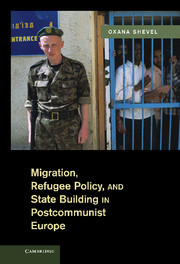6 - Poland
Published online by Cambridge University Press: 25 October 2011
Summary
This chapter analyzes the role of refugee policy elites and UNHCR strategies in shaping policy outcomes in Poland, the second of the two uncontested postcommunist states in this study. As we will see, Poland was different from the Czech Republic on both dimensions of causal importance. The elites who were in charge of Polish refugee policy during most of the 1990s were not of dissident and liberal intelligentsia background like their Czech counterparts and held more conservative views with regard to refugees. The role of the UNHCR was also different: Because the Polish parliament did not get involved with refugee policy matters until the mid-1990s, the UNHCR engaged in legislative lobbying in Poland later than in the Czech Republic. These factors made Polish refugee policies less liberal than the Czech ones in the 1990s, although in recent years, in particular with the start of the EU accession process, the politics of refugee policy in Poland and the Czech Republic became more similar.
Polish Transition and Refugee Policy Elites
If dissidents and intellectuals were in charge of the Czechoslovak and later the Czech refugee policies, the background of Polish refugee policy elites was very different. This difference was in part a product of the different nature of the transition from communism. Different mode of extrication from communist rule (abrupt and quick in Czechoslovakia, pacted and gradual in Poland) in turn had roots in the different nature of the communist regime in these two states. In the period since Stalin’s death, communist regime in Poland was less hard-line than in Czechoslovakia. In 1956, Poland experienced a political “thaw” when the hard-line Stalinist regime was replaced by a national communist leadership. Polish society’s rejection of communism led to recurrent crises in the following decades, culminating in the 1980–1981 large-scale strikes of Polish workers and the emergence of the Solidarity trade union as an umbrella movement uniting all the forces of the anticommunist opposition. The regime negotiated with the striking workers, and even after the imposition of martial law in 1981 that banned Solidarity, a number of changes in the state’s institutional structure took place, such as the establishment of judicial organs such as State Tribunal, Constitutional Tribunal, and the office of ombudsman. Throughout the 1980s, banned Solidarity remained a social force with broad popular support.
- Type
- Chapter
- Information
- Publisher: Cambridge University PressPrint publication year: 2011



